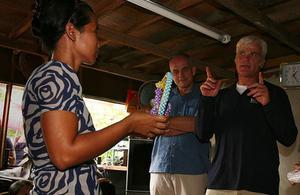Boost for Burma with new UK funding
Desmond Swayne announces new funding for Burma while on a visit to the country

International Development Minister Desmond Swayne, talking to a business woman who has benefitted from a DFID-supported micro-finance scheme in Burma. Picture: DFID
The UK remains committed to supporting Burma to reach its potential as a peaceful and prosperous country that respects the human rights of its entire people, International Development Minister Desmond Swayne said while announcing new funding at a reception to mark 10 years of DFID’s presence in Burma.
The funding, that will increase direct UK support to Burma from £64.7 million in 2014/15 to £82 million in 2015/16, was announced by Desmond Swayne during a three day visit to Burma, his first official overseas trip since taking on the role of International Development Minister in July.
This will enable DFID to bring forward several important new programmes, including:
- a new £25 million Democratic Governance programme to help support next year’s crucial elections, including ensuring that women’s voices are heard both as voters and candidates; and
- a further £16 million of new funding for the Livelihoods & Food Security Trust (LIFT) which helps small holders to upscale their operations and provides farm labourers with the skills and support to move beyond agriculture. LIFT has already helped 1 million people increase their food security and is on track to help 2.5 million people boost their income and production by 2018.
Desmond Swayne said:
Burma stands at a historic crossroads and the chance for it to become a peaceful and prosperous country is now closer than ever. However, in order to achieve this goal, next year’s elections must be credible, transparent and inclusive.
DFID is still working hard to help hundreds of thousands of people affected by conflict and inter-communal violence, but now, more than ever before, there is also huge potential for growth within Burma. One of our key aims is to help the Burmese people, and the government, to harness that potential and build a stronger society with more jobs and opportunities for everyone, as well as better healthcare and schooling.
When the devastating Cyclone Nargis hit Burma in 2008 the UK was among the first to respond and I hope this new funding shows that we remain committed to helping the Burmese people rebuild their lives and leave poverty behind.
While in Burma the Minister met with farmers, small entrepreneurs, civil society leaders, people displaced by conflict, government ministers and Aung San Suu Kyi. He talked about how the UK can continue to support Burma on its journey towards a more inclusive and democratic society whilst improving respect for human rights. In Yangon he also saw first-hand how the British people are helping some of the poorest men and women in the region to start small businesses and earn a living.
The new funding package builds on previous achievements made possible through DFID’s support, which include:
- vaccinating 100,000 children against measles;
- helping 170,000 children to complete primary school;
- providing 135,000 women with micro loans;
- ensuring over 100,000 women were visited by health workers during pregnancy;
- providing skilled workers to attend 59,000 births;
- increasing food security for 821,000 people;
- treating 230,000 people for malaria; and
- supporting Burma’s candidacy for the Extractives Industry Transparency Initiative (EITI).
With Burma’s natural resources, location, its dramatic reform trajectory, and the youth, goodwill and commitment of its people, the possibility of graduating from international aid within a generation is within reach.
Notes to editors
-
Desmond Swayne was in Burma for a three day visit from 25 August. During this time he visited Yangon, Kachin and Naypyitaw.
-
DFID has had a presence in Burma since 2004.
-
When Cyclone Nargis hit in 2008, DFID provided over £50m of assistance including direct relief to 82,000 households. Further support was provided after Cyclone GIRI in 2010.
-
In 2012, reforms in Burma including the release of many political prisoners saw EU sanctions and restrictions on development assistance being lifted enabling DFID to publish a new vision: “A resource-rich Burma that is accountable to its people and open to responsible investment has great potential to reverse years of decline. Our aim is to help Burma to harness this potential – to help create a better governed, more peaceful and prosperous Burma that uses its increased wealth to reduce poverty.”
-
The DFID Burma office in the British Embassy in Rangoon now comprises 19 Burmese and 10 international staff. DFID remains one of the major humanitarian donors in Burma.
-
You can read more about DFID in Burma here https://www.gov.uk/government/world/organisations/dfid-burma
General media queries (24 hours)
Email mediateam@dfid.gov.uk
Telephone 020 7023 0600
If you have an urgent media query, please email the DFID Media Team on mediateam@dfid.gov.uk in the first instance and we will respond as soon as possible.